DIY testing could put rape survivors 'at risk'
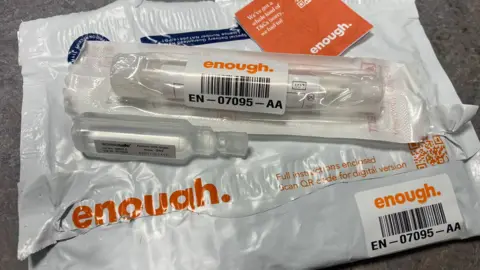 BBC
BBCSelf-swab DNA testing could put rape survivors "at risk", forensic experts say, with a leading lawyer adding he is "horrified" kits are being given out to students.
The kits allow people who think they have been sexually assaulted to take a swab at home and get it tested for the DNA of an alleged perpetrator and have the results stored.
The company Enough has handed out 7,000 of them in Bristol, saying they act as a deterrent at a time of "intolerable levels of rape" and provide a route to report outside the criminal justice system.
But experts say they risk giving victims false hope as the Home Office, lawyers and Faculty of Forensic and Legal Medicine say they may not be usable as evidence in court.
Enough co-founder Katie White, 29, said: "The world needs to wake up to the fact the current solutions are not working and we need to try new things."
The company spent 18 months researching what victims want, she said, adding their approach aims to "validate" survivors.
Content on Enough's social media channels has been viewed more than 10 million times, and Miss White argued "social justice" outside of the criminal justice system could be a powerful deterrent.
She said: "It is only really legal experts that take it down the whole chain and say 'well it is not a deterrent because it might not be admissible in court'.
"For a student at university just the possibility of their DNA being held on file is quite a terrifying thought."
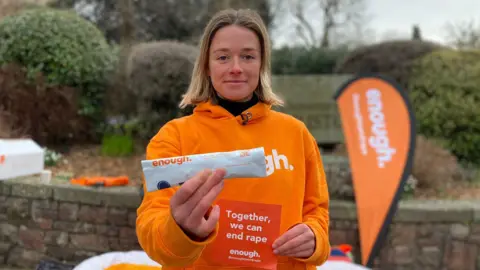
Statistics show there were 69,184 rapes reported to the police in England and Wales in the year ending June 2024, according to the Office for National Statistics.
But the national Crime Survey shows 83% of people raped in England and Wales did not report it to the police.
Enough was set up against this backdrop, and has been handing out free DNA testing kits to students in Bristol since October. It is also selling them online for £20 to allow people outside the city to access them.
The swabs are posted to a laboratory, where testing will show if someone else's DNA was found and, if so, the sex of the DNA profile.
Half the sample is then frozen and can be kept for up to 20 years, to be handed to the police if the incident is reported.
But the kits have come under increasing scrutiny from legal and medical experts.
- If you have been affected by the issues in this article, help and support can be found at BBC Action Line.
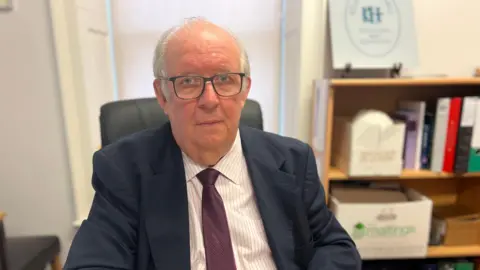
Bristol solicitor Ian Kelcey has represented people in multiple rape cases and said he was "horrified" by the kits.
From a legal perspective, he added, they were "fatally flawed" and might not be any use even if the information they provided was accurate.
"There is going to be no continuity of the sample. The risk of contamination to my mind is enormous and I think that would kill it at the first hurdle," he said.
"I think people are being lulled into a false sense of security because I don't think there's much likelihood that these would evidentially be admissible."
He added the main issue in most rape cases was consent, something the kits would not help with.
Enough said the DNA results it collected were not currently being compared to either each other or the national DNA database.
Senior barrister Tana Adkin KC, who has represented rape victims and also rape suspects, said this was another reason the kits were not likely to be a successful deterrent.
The Faculty of Forensic and Legal Medicine (FFLM) maintains professional standards in forensic and legal medicine.
In September 2024 it issued a joint statement, from a number of individuals and organisations, including clinicians, forensic scientists and the Forensic Capability Network (FCN), on the issue of self-swabbing kits.
It said it did not currently support the use of self-swab kits, adding that without the right information they could "put survivors at risk".
It said: "Self-testing does not necessarily provide reliable independent evidence, may not enable survivors to choose whether to report to the police later and therefore does not prevent perpetrators from acting against others."
The FFLM's statement calls on any companies marketing self-testing kits to provide specific information on a number of forensic and legal points, which can be found within Enough's privacy policy - at the bottom of its website.
The Home Office has also had its say, warning samples "may not be admissible during criminal proceedings".
In the USA, several states, including New York and Michigan, have either banned similar kits or sent cease-and-desist letters to the companies marketing them, leading to the companies responding with legal action.
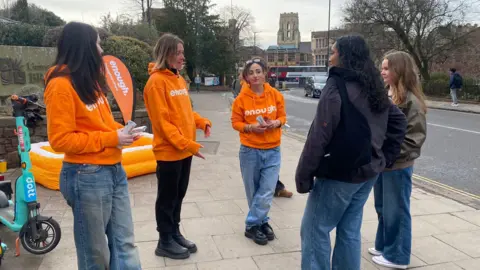
Every week Enough volunteers hand out the kits to students - along with a bag of chocolate - with many intrigued to find out more about what was going on.
International studies student Eve, 21, said: "I've seen them a lot recently. I think the word 'Enough' - I automatically thought it would be to do with rape or sexual violence."
But when asked, some students thought the kits could be used as evidence in court, and some have questioned whether they were aware of the right information.
Florence Snoxell, 19, said: "I would be worried it would put women or men off going and getting tested [at an official centre]... because they think this is enough, in which case it could actually undermine the cause."
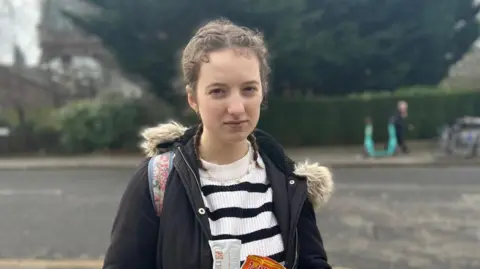
But Miss White said the only thing harming survivors was the current "flawed" justice system which did not give them "closure or validation".
Enough states on its website that 270 "reports" of sexual assault have been made to it since it started handing kits out.
Of those, seven included DNA swabs sent for testing. The others were written testimonies - some dating back before when Enough launched in Bristol.
Even if the samples cannot be used in court, Miss White argues "having something is better than nothing" and Enough is about more than just a legal procedure.
"It's not so much what happens with the DNA, it is the possibility of it being held on file," she said.
"Students in Bristol now know there are DNA testing kits in most university houses... that will make someone think twice about the importance of consent."
Rape charities, including SARSAS, have also raised concerns that self-swabbing could lead to victims missing out on the extra support they get at Sexual Assault Referral Centres (SARC).
Medical professionals there collect a number of swabs in an environment where the validity of the results is not in doubt.
And while this forensic process may be daunting to some, the police, sexual violence charities and the NHS all recommend using the official routes as the best way to get help and justice.
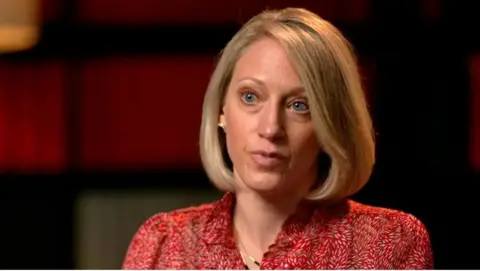
Miss White said Enough's website pointed people to where they could get further support and if a person wanted to get the police involved, they should go to a SARC first.
Claire Waxman, Victims' Commissioner for London, said while she agreed more needed to be done to tackle the underreporting of rape and sexual assaults, she was concerned about misinformation surrounding self-swab kits.
"Victims need clear information of where to go, pathways for support and justice and that is absolutely through our sexual assault referral centres," she said.
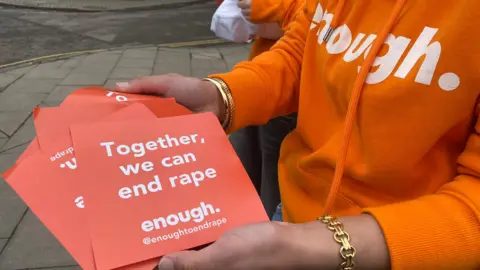
Miss White said she would like all the agencies involved to work together rather than argue over the possible use of the kits in court.
"We need to stop doing reports and criticising any new ideas that come forward and start trying new ways," she said.
With only seven kits returned and sent for testing so far and none yet trialled in court, the scheme is proving controversial, but Enough says it is planning to expand and will take the kits elsewhere.
Additional reporting by Joe Skirkowski, Kaushal Menon Muralidharan and Martin Jones.
Follow BBC West on Facebook, X and Instagram. Send your story ideas to: [email protected] or via WhatsApp on 0800 313 4630.
